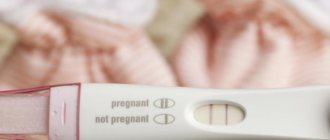IVF: the purpose of the procedure and the reasons for the absence of menstruation
Artificial conception is an opportunity for women to become mothers. However, if the reproductive system is in a normal state, in vitro fertilization is not performed.
It consists of combining female and male reproductive cells in a laboratory setting. After this, the fertilized egg is implanted into the uterus.
Indications for the procedure:
- Pathologies of the fallopian tubes that prevent conception.
- Lack of the desired result after artificial insemination.
- A severe form of endometriosis, leading to deterioration in egg quality.
- Limited number of eggs for conception.
- Heavy male factor.
It is important to monitor hCG levels after IVF. To do this, it is recommended to take a pregnancy test. The first study is carried out 2 weeks after the procedure.
Menstruation comes late after unsuccessful IVF. Typically, after support is canceled, critical days occur 4–6 days later.
The presence of blood discharge from the vagina in the first month after in vitro fertilization does not bring joy, as it indicates an unsuccessful procedure.
Sometimes the delay in menstruation after IVF is 10–12 days. It is observed in women who have undergone IVF during menopause.
Lack of menstruation after the procedure may be caused by:
- mental stress. Negative emotions provoke active production of cortisol (stress hormone) by the body;
- incorrectly selected hormonal therapy;
- inflammatory process in the pelvic organs;
- large detached parts of the inner uterine lining.
Possible changes in the menstrual cycle
After an unsuccessful attempt to conceive, changes in the nature of menstruation may be observed:
- heavy periods after IVF;
- duration up to 12 days;
- density due to the rejected thick uterine functional layer;
- after IVF, periods may be painful;
- general discomfort.
The menstrual cycle can change for a number of reasons:
- During the protocol, reproductive and endocrine function was actively stimulated to achieve superovulation and further implantation.
- Many drugs taken after embryo transfer were aimed at thickening the walls of the endometrium and its tight attachment to the uterine wall, which is manifested by the release of dense mucous blood clots in the first cycle.
- To clear the dense endometrium, the uterus begins to contract very intensely, causing severe pain in the woman.
- After discontinuation of luteal therapy, a sharp jump in the hormone estrogen occurs, provoking the abundance and duration of menstruation.
These changes in the cycle are short-term and are considered as a variant of the norm. They can be corrected with vitamin-mineral complexes and sedatives.
In the following menstrual cycles, menstruation comes on time in an individual manner for the woman.
Complete restoration of the ovaries and endocrine system occurs after 3 months. After this period, repeated IVF attempts are possible. With each attempt, the chance of a successful outcome of the procedure increases.
You should not insist on the next implantation immediately after your period; it is important to give the body time to recover, otherwise the risk of repeated failure increases.
Unsuccessful IVF is not a reason to give up; this is obvious to 60% of couples who have undergone the procedure for the first time. Modern methods of reproductive technology are capable of miracles. More than four million babies have been born worldwide through IVF. Yes, the path to success for their parents was very difficult and slow. It takes a lot of patience, strength and endurance. The obligatory attitude towards good luck and faith will help in making your cherished dream come true.
If menstruation begins after IVF, it is often characterized by certain features. There may be a lot of discharge and clots. Thus, the inner mucous layer of the uterus, which was not useful due to a failed pregnancy, peels off.
Menstruation can last 10-12 days. This is necessary for the body to completely cleanse itself, since the functioning of the reproductive system was affected by artificial progesterone. Those processes that previously occurred naturally in the uterus were stimulated.
Many people experience characteristic pain in the lower abdomen
There are pulling sensations in the abdomen. This is due to spasms in the uterus, which seeks to cleanse itself of unusable endometrium. Possible deterioration in general health. Even those patients who do not experience discomfort during normal menstruation, feel pain in the abdominal area during menstruation after an unsuccessful IVF protocol. This is usually associated with psychological stress and hormonal stress on the body.
These symptoms are a consequence of the influence of hormonal therapy on the female body, as well as the result of psychological stress due to the failed opportunity to become a mother.
If during menstruation a woman experiences symptoms such as:
- Scarlet discharge. This indicates the presence of uterine bleeding, which must be stopped. Otherwise, this can lead to anemia, and in the worst case, coma.
- Increased temperature and severe pain. Indicates the presence of an inflammatory process. Perhaps pathogenic microflora was introduced due to inappropriate IVF procedures or exacerbation of chronic diseases.
- Critical days do not end. If menstruation lasts for a long time after unsuccessful IVF, then serious endocrine disorders can manifest themselves. As well as exacerbation of serious chronic diseases.
There may even be an increase in temperature.
If these symptoms occur, you should immediately go to the hospital.
If IVF fails, the woman may notice significant changes in the nature of her menstrual flow. When menstruation begins after unsuccessful IVF, they may have signs of uterine bleeding: quite heavy blood loss with clots. This is quite understandable due to previously carried out manipulations to stimulate ovulation according to the protocol, the use of hormonal drugs, since for successful implantation of the embryo after replantation, the endometrium must have sufficient thickness, be juicy and well supplied with blood.
After unsuccessful IVF, when your periods are sharply painful and accompanied by acute pain in the lower abdomen, you should not take painkillers and antispasmodics, but immediately contact a medical facility to diagnose this condition.
Many women note that their periods began earlier after IVF and were quite short. This fact can also be explained by the fact that the secretory transformations of the endometrium did not have time to occur and menstruation has this character. Such changes should not be observed during the next menstrual bleeding. After IVF, when menstruation starts worries almost all women
If a woman took drugs during the in vitro fertilization protocol that corrected hemostasiogram parameters, then the menstrual blood may be bright red, scarlet, without clots.
In the first cycle after an unsuccessful protocol, the patient may be accompanied by discomfort such as a feeling of weakness, nausea, vomiting, which is also associated with taking medications, and by the second cycle such phenomena should be leveled out.
Women need to know that if the first menstruation after an unsuccessful attempt to use assisted reproductive technologies was not typical for them, then in 80% of cases the second menstruation should be without any changes. If menstrual flow is unusual in subsequent cycles, then it is imperative to consult an obstetrician-gynecologist to carry out a set of diagnostic measures in the form of at least a general examination by a gynecologist, a gynecological examination and an ultrasound examination, during which such pathological processes can be identified , such as the presence of cysts on the ovaries, placental hyperplasia, endometrial and cervical canal polyps, and other pathological conditions of the reproductive system.
It is not recommended to independently correct ovarian-menstrual cycle disorders with medications. Periods during IVF pregnancy are also possible.
The only measures a woman can take are:
- Correction of diet and diet;
- Adjust work and rest schedules;
- Maintain psycho-emotional peace;
The main thing is to purposefully move towards achieving the happiness of motherhood. It must be remembered that each subsequent attempt at in vitro fertilization is more successful than the previous one, since reproductive doctors manage to find out the reasons for the failure and prevent them in subsequent protocols. The Federal program for free implementation of the basic in vitro fertilization protocol, financed by the Compulsory Medical Insurance Fund, can help such families.
Women often note that the nature of the discharge changes after IVF. Such violations can be of several types.
- The bright scarlet color of the discharge without clots is a consequence of the drugs used. This will go away with subsequent cycles.
- General malaise during menstruation, reminiscent of toxicosis (weakness, nausea, pain in the lower back or lower abdomen). These manifestations are associated with the restructuring of the body during IVF.
- The first period after the procedure may be clotted and heavier than usual. This is due to the effect of hormonal stimulation on the thickness of the endometrium. Often during superovulation, the endometrium connects more tightly than usual to other uterine layers, which leads to strong contractions of the uterus with the appearance of clots and pain. Ultrasound reveals an increase in the size of the ovaries.
- A long delay in the “critical days” after IVF may be the cause of cysts, polyps or other neoplasms. Such abnormalities can be detected by ultrasound.
- Irregularity of menstruation. This situation often occurs due to manifestations of hormonal imbalance. However, under no circumstances should a woman take hormones on her own. It is especially dangerous to do this after embryo rejection (days of unstable hormonal balance). For normal hormonal balance, gynecologists can prescribe complex treatment. It also requires a review of a woman’s entire lifestyle with normalization of nutrition, the introduction of self-regulation exercises, and physical exercise (excluding active stress on the abdominal muscles).
After a failed protocol, the pattern of menstrual bleeding may change. Normally, it should recover within three months. If the discharge is abundant or scanty, comes with clots or an unpleasant odor, you should see a gynecologist. Heavy bleeding, which causes pain in a woman, is considered dangerous.
The reason that after a failed IVF period came heavily is hormonal support. Progesterone-based drugs stop the growth of the endometrium and make it looser. The mucous membrane becomes permeated with many small vessels.
When the endometrium is rejected, heavy bleeding occurs. Normally, it should not last more than 7 days and worsen the woman’s well-being. If pain appears against the background of bleeding and the body temperature rises, then the patient has begun an inflammatory process.
With clots
In the first cycle after unsuccessful IVF, menstruation may be accompanied by clots. This is how the overgrown endometrium comes out. This condition is considered normal if it occurs once.
Scarce
Scanty periods in the IVF protocol may occur during pregnancy. A woman mistakes the discharge for a new cycle. In reality, bleeding begins due to the threat of miscarriage or underlying diseases of the cervix. If the discharge is scanty, it is necessary to take a blood test and do an ultrasound to rule out pregnancy. Only after this can supporting hormonal medications be discontinued.
https://youtu.be/kJUXR1ryjV4
Probability of successful IVF the first time
After a successful egg transfer, there is no menstrual discharge. In this case, fertilization occurred. But after unsuccessful IVF, periods begin with a delay.
According to medical statistics, in vitro fertilization is successful in 50% of cases.
Factors influencing the result of embryo transfer:
- Age. After 30 years, the chance of a successful pregnancy after artificial insemination is lower.
- The reason for the impossibility of conception. For example, if there is obstruction of the fallopian tubes that prevents pregnancy, the chance of a successful procedure is higher. But with endometriosis or polycystic ovary syndrome it is lower.
- Medical competence. Menstruation after IVF with incorrectly selected therapy can not only come with a long delay, but also be accompanied by severe pain. The gynecologist must select the optimal medication regimen for the patient. Only in this case will artificial insemination be successful.
- Patient compliance with medical instructions. In order for pregnancy to occur after artificial insemination, you need to follow the doctor’s recommendations regarding lifestyle, nutrition and medication.
- Sperm quality. In medical practice, the ICSI method is often used - selection of the most active sperm. Thanks to this, it is possible to increase the chances of successful conception.
Successful cage placement
On days 6-8 after IVF, the fertilized egg should be implanted into the uterine mucosa. At this moment, the zygote deepens and becomes fixed in the endometrium. At the same time, it can damage its capillary network, so there may be bloody discharge that is not menstruation! Such bleeding will be a signal of successful implantation of the egg, and the following features distinguish it from normal menstruation:
- a small amount of discharge that is spotting in nature;
- the discharge is not dark red, but a brownish tint;
- with implantation bleeding, women should not experience pain in the lower abdomen;
- The discharge does not last long (2-4 days).
If this type of bleeding occurs, you don’t have to worry about IVF failure, but you should still visit a doctor and get tested for hCG, which will definitely show whether implantation has occurred.
What does menstruation after IVF mean?
If the in vitro fertilization procedure is unsuccessful, the nature of the first menstrual flow will differ from the usual. If after IVF they come with a delay, then there should be no reason to panic. A cycle shift of 3–9 days is considered acceptable.
If a woman over 50 years old after artificial insemination starts her period on the 12th day after the procedure, this is normal. The chances of pregnancy at this age are minimal, so you can’t count on a successful embryo transfer.
After an unsuccessful IVF protocol, complaints may arise:
- for long critical days lasting more than 10 days;
- change in the nature of menstrual flow. Menstruation after unsuccessful IVF becomes more intense on the 2-3rd day, the blood contains clots;
- painful desquamation. The separation of the uterine endometrium is accompanied by severe discomfort in the lower abdomen.
It is also possible to have a second period in one month. 2 menstruation in 1 cycle is a reason to consult a gynecologist. But if the recurrence of bleeding does not cause discomfort, then there is no need to worry.
When to expect your first period after unsuccessful IVF
If pregnancy does not occur, it is logical that the next period will come soon. But after the IVF procedure, everything may be different, because the full completion of the protocol includes the use of various drugs that affect the functioning of the reproductive system. And some of them can cause hormonal imbalances.
When to expect your period? Even an experienced specialist will not give an answer to this question, since everything is purely individual and depends on the characteristics of the woman’s reproductive system and the entire body as a whole. If pregnancy does not occur, after stopping all hormonal medications, the next period will come after a period of 3 to 10 or 12 days.
After the IVF procedure, delays are possible: this is not uncommon and is not considered a deviation, because going through the protocol is a large burden on the female body and a serious interference in its work, causing hormonal disruptions.
What are the complications from the procedure?
IVF, in principle, is implemented successfully only in 35-40% of all cases. But there are also a number of complications that arise during or after the procedure.
- With an ectopic pregnancy, the risk of rupture of the fallopian tube is so high that it is surgically removed along with the fertilized egg.
- Frozen pregnancy syndrome. This phenomenon occurs both during natural fertilization and IVF. True, with artificial insemination it is still more common.
- With hyperstimulation syndrome of pregnancy, the monthly cycle is disrupted. For subsequent recovery, the woman has to undergo hormonal treatment.
The doctor will tell you what kind of periods occur after unsuccessful IVF after a complete examination of the woman.
Reasons for missed periods after IVF
Sometimes after IVF there are no periods for a long time, but this is not associated with pregnancy. Menstruation may not begin for a long period due to the following reasons:
- severe stress after an unsuccessful procedure;
- development of depression against the background of unsuccessful IVF;
- long-term recovery of the reproductive system after hormonal therapy;
- ectopic pregnancy.
Severe emotional shock and depression increase the secretion of the stress hormone cortisol by the adrenal cortex, which negatively affects the functioning of many body systems, especially reproductive. A woman should understand that IVF may not work out the first time, and she should not be upset, because in the future this will lead to health problems and will significantly reduce success in subsequent attempts to get pregnant.
Sometimes hormonal therapy is too much of a shock for the body, so it can take up to a year to restore a normal menstrual cycle. In such cases, a woman must take all actions to normalize the functioning of the reproductive system (they will be discussed below).
The last factor due to which menstruation does not begin is an ectopic pregnancy. Is it possible to check it using tests? During ectopic implantation of the egg, hCG does not increase to the same extent, since a significant part of this hormone is synthesized by the endometrium after implantation of the egg. Therefore, if the hCG analysis shows no pregnancy, and menstruation does not start within 3-4 months, it is necessary to undergo additional examination, including a pelvic ultrasound and a blood test for hormones.
Reasons for delay in case of negative fertilization outcome
The main reason is always stress and psychological tension. Many women become depressed after receiving a negative hCG test result. This further disrupts the hormonal system. Constant nerves and tears do not allow the body to balance and begin to function normally.
Important! Doctors should be contacted if more than 10 days have passed since a negative hCG test, which confirmed that the IVF procedure was unsuccessful and menstruation has not started.
There are cases when the first menstruation comes on time without significant delays, but later cycle disruptions appear. This is also quite common. The cycle after unsuccessful IVF can take from 3 to 6 months to recover. In some cases, it may take a year to restore it.
In very rare cases, doctors induce menstruation with medication. This is only permissible under medical supervision; self-administration of potent hormonal drugs is life-threatening.
After unsuccessful IVF, some women experience pronounced premenstrual syndrome, which manifests itself in the form of nausea, dizziness, headache, and nagging pain in the lower abdomen. Many begin to think that these are symptoms of early pregnancy. But it’s too early to draw conclusions before testing for hCG.
You cannot “prescribe” yourself any medications to “support” pregnancy. This is a serious interference in the functioning of the endocrine system, which can lead to both a pregnancy failure (if there really was one) and an even longer delay in menstruation.
The appearance of bloody discharge in case of successful transfer
- The main and long-awaited reason is implantation bleeding, while the discharge is small and ends quickly.
- Minor trauma to the vagina or cervix that occurred as a result of egg retrieval. The discharge is also minor and stops within a few days.
- If pregnancy has occurred, but heavy bleeding begins, similar to real menstruation, accompanied by pain, it is necessary to urgently call an ambulance; these are symptoms of an incipient miscarriage.
If, while waiting for a two-week hCG test, there is slight bleeding, then ends, then begins, but there is no pain or discomfort, an analysis is prescribed for progesterone levels, and the dose of hormonal support for the endometrium is increased in order to preserve the pregnancy, if it has taken place.
The nature of menstruation and possible changes
Duration
As a rule, they will last longer than usual, this should not be scary. But in rare cases, on the contrary, they can be much shorter, literally 2-3 days.
Abundance
The first periods after unsuccessful IVF will definitely be heavy. They may even come with clots. This is due to the fact that hormonal stimulation was carried out, causing thickening of the endometrium. Now the body must get rid of it, so heavy periods should not be surprising.
During superovulation, the endometrium connects with other layers of the uterus much more tightly than during normal ovulation. This leads to the fact that the uterus begins to contract much more strongly during menstruation, rejecting tissue that the body does not need, and clots may appear. An ultrasound scan at this time shows that the ovaries are increasing in size.
Attention! In rare cases, periods can be very unusual - in the form of bright scarlet blood, in which there are no clots at all. This is an individual reaction of the body to the drugs that were used to prepare for IVF. With further menstruation, everything should return to normal.
Soreness
The first period after unsuccessful IVF will definitely be much more painful than usual. This happens for the reason stated above. The uterus will contract much more strongly to get rid of the thickened endometrium, which is why pain and cramping will occur.
Presence of PMS
Even if its manifestation is uncharacteristic for a woman, after a failed IVF, almost everyone will encounter it. It manifests itself in the form of emotional lability, dizziness, and attacks of nausea.
Premenstrual syndrome may appear a week before your period. It may be accompanied by a small brown smudge, or it may be completely absent. Often women confuse it with toxicosis and hope that pregnancy has occurred.
Cycle length
It all depends on the individual reaction of the body. For some women, their second period may arrive on time. For others, much earlier than expected. For others, the cycle will, on the contrary, increase.
Regularity
In any case , you should not expect that menstruation after a failed IVF will go exactly according to schedule. Cycle failures are likely to occur. It will take at least three months to recover.
Changes in the body that affect the cycle
In order to ensure successful implantation of the embryo in the uterine cavity and prevent miscarriage, the expectant mother must take medications containing progesterone, which suppress estrogen synthesis, before the procedure and for several days after. After their withdrawal, hormone levels change dramatically. Suppressed estrogens begin to be produced intensively, helping to restore cyclicity. The endometrium, which has grown under the influence of medications, has a denser structure than usual. To reject it, the muscles of the uterus have to contract more strongly. That is why the nature of the discharge changes dramatically, and menstruation is painful. How long menstruation lasts after an unsuccessful attempt at fertilization depends on the physiological characteristics of the woman. Probably both a pronounced lengthening of them for several days, and simply a more abundant character.
However, in some cases, progesterone can cause a subsequent decrease in estrogen synthesis, which leads to a delay in the rejection of unnecessary mucosa, and menstruation after IVF occurs late. A delay of several weeks beyond the expected period often indicates a temporary hormonal imbalance in the body.
When should we expect critical days after a failed protocol?
As a rule, after a negative hCG test, menstruation occurs within 3-12 days. Initially, a small brown “daub” begins, which turns into normal menstruation.
IVF is a serious blow to the hormonal system and the woman’s body, so delays in menstruation after an unsuccessful procedure are quite natural. After some time, the hormonal system comes to its natural balance, but the timing of this is different for each woman.
You need to react to a delay in menstruation correctly and understand that sooner or later they will begin anyway. You should not console yourself with thoughts that pregnancy has occurred, but it was not recognized. Unfortunately, the hCG test gives a 100% result. If it shows that fertilization has not occurred, menstruation will definitely begin.










